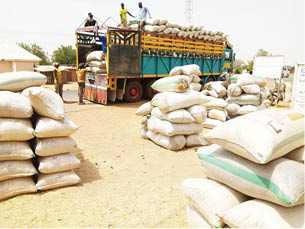There were fear and concern by farmers and grain traders in Yobe State after the state government announced its plan to take measures to stop hoarding of grains and other essential commodities by businessmen and middlemen in markets across the state.
Daily Trust on Sunday learnt that the state government also said bulk purchases from Yobe markets would be closely monitored by security agents to prevent and stop hoarding to curtail the creation of artificial scarcity and hike the prices of such grains and other essential commodities.
“The purchase and transportation of large quantities of grains outside the state will be monitored to ensure that speculators and hoarders do not take advantage of Yobe market to cause artificial scarcity and deepen food insecurity in the country,” the state government said.
The state government inaugurated a 24-man committee headed by Deputy Governor Idi Barde Gubana to halt exporting, hoarding and artificial food scarcity.
“The committee will coordinate with security agencies, the sale of procured grains to the public at subsidised prices, and they are to advise the government on any other measure necessary to address the problem of food insecurity in the state,” the government added.
The deputy governor said, ‘‘Some unscrupulous elements are seriously trying to undermine our serenity by causing additional hardship to the people through unnecessary bulk purchase and hoarding of staple foods.”
Reacting to steps taken by the state government, some grain traders told Daily Trust on Sunday that the move would only affect their businesses and customers who are coming from Chad, Cameroon and Niger but it would not make any impact or reduce the price of food in the country.
Adamu Ibrahim, a grain trader in the Potiskum grain market, told Daily Trust on Sunday that the indefinite closure of Niger’s border with Nigeria had affected his business associates more than recent measures taken by the Yobe State Government.
‘‘There are businessmen who are my longtime friends; they used to come here to buy grains in bulk and take to Niger before these border restrictions. As I am talking to you now, these people are not coming.
‘‘Five years back, I used to buy 50 to 100 trailers of grains in this market for them and they would give me some incentives before taking the foodstuff to Niger Republic. These people are not coming here anymore after the border closure. Thank God they (ECOWAS) have reopened the borders.
‘‘For the Yobe government’s plan to ban bulk purchase to curtail artificial food scarcity, I think it is needless because two things that are skyrocketing food prices are production and transportation.
‘‘The prices of fertiliser and insecticide are increasing daily, also the elimination of fuel subsidy has increased the price of grains because you have to buy petroleum for irrigation farming, and after you harvest your crops, you must hire a truck that will transport them.
‘‘These are things that swallow our earnings. A trailer driver must buy fuel at a high price before he transports your goods to the market. Also, the amount of money farmers are investing in their farmlands is too much. So, the government should check these things and subsidise them before taking any action on banning bulk purchase of grains.
‘‘Previously, we used to pay N1,000 per bag to be transported, but now, for each bag of paddy rice or millet, you must pay N4,000 for transportation from Adamawa to Yobe,” he added.
Alhaji Abdullahi Potiskum, the chairman of Potiskum Grains Market, told Daily Trust on Sunday that measures taken by the Yobe State Government would only make a little impact but would not change things as the government and people are expecting.
‘‘You might not know if these people (grains exporters) are Nigerians or not because they have agents here and there. Some of their agents are our people who are selling and buying in the markets, so you cannot even know who they asked to buy these grains for them.
‘‘First, this increment in the prices of grains is not artificial, it happened as a result of poor yield in the last two years due to climate change in Yobe and Borno.
‘‘Secondly, the prices of farm inputs are skyrocketing daily. If you look at the prices of fertiliser, fuel and labour you would know your answer. And if you harvested your crops before taking them to the market, it is another problem because transportation can swallow half of what you spent on the farm.
‘‘Thirdly, we traders are not buying these grains at subsidised prices. Some of these goods we brought from Sokoto, Katsina, Jigawa and Taraba. Last week, we paid N500,000 just for transporting our grains from Jigawa to Potiskum. And the driver of the trailer had to add some goods from other costumers before making a profit as the N500,000 we paid for our goods would not fuel his vehicle from Jigawa to Yobe.
“These are the things that increase the price of foodstuff. We have to sort this N500,000 from our goods before we start thinking about profit.
‘‘Two years back, we used to pay N400,000 for a trailer to load our goods from Illela Local Government Area in Sokoto State to Potiskum, but now, you must pay N1.2 million before they evacuate your goods to this place. And as you know, there are some grains we are not producing here.
“Some years back, a trailer driver could drive from Potiskum to Kano empty, just to evacuate the goods you bought in Kano, but now, I swear that no one can do that for you. The driver has to wait for passengers or load goods from here to Kano before he evacuates your goods in Kano to Potiskum because the price of fuel is obvious.
‘‘These are the things that increased the prices of grains. Farmers will do production from seed planting to harvesting at the highest cost and he has to make profit. As a trader buying grains and transporting them to markets in a very high cost, you are thinking profit. These are the causes of food price increase,’’ he added.
The chairman of the Amalgamated Market Traders Association, Alhaji Nasiru Mato, said government should review the restrictions because trading is about exchange of goods.
‘‘As you know, Potiskum is the centre of grain trading in the North East. We don’t farm maize, so we have to search for it from Adamawa, Sokoto or Jigawa and bring it here.
‘‘Potiskum people are also not rice farmers. Even in Yobe, it is only some parts of Bade and Nguru local government areas that are doing it. However, we are cultivating beans for sale and consumption, so we are not hoarding it.
‘‘There are grain traders who used to bring these items (maize and rice) here to sell because we have a large market. We only trade to make profit. So, if you ban exportation of grain, who will bring them to us? And do you think that this market won’t collapse? We have people who purchase these items in bulk and sell them to make profit. This is what they have been doing for long.
‘‘So, the government should review these restrictions for businesses to thrive because we export what we have, like grains, and import what we don’t have, for human consumption,’’ he said.
But the Commissioner for Information and Culture in the state, Abdullahi Bego, said the steps were taken to ensure that people got relief temporarily, hoping that things would get better.
‘‘As you might be aware, Governor Mai Mala Buni formed a committee last week headed by the deputy governor, Idi Barde Gubana, to advise the state government on things that could bring succour to the public and other measures necessary to address the problem of food insecurity in the state.
‘‘As we speak, we are grateful to God that things have begun to get better for the people, at least temporarily. We hope that things would get better,” Bego said.

 Join Daily Trust WhatsApp Community For Quick Access To News and Happenings Around You.
Join Daily Trust WhatsApp Community For Quick Access To News and Happenings Around You.


